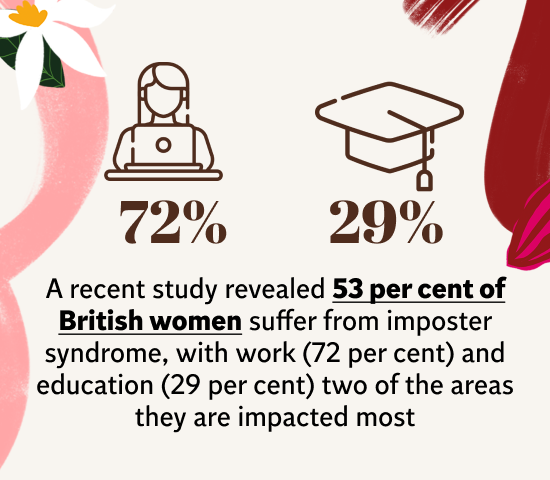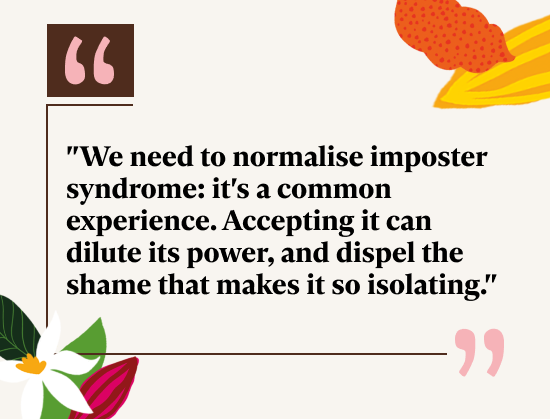Anatomy of imposter syndrome: what it is and how to handle it
Celebrities from sports stars to presenters are opening up about it, and people can experience it everywhere from work to social events, and even at the gym. But what is imposter syndrome, and how can you manage it? We deep-dive into the condition, and discover effective, expert ways to get it under control
A scenario: You’re at work when your boss springs a last-minute presentation on you. Do you: a) Work on it till end of day, accept that while it might not be perfect, it has its charms, and feel proud of yourself once it’s done for pulling it off under pressure. Or b) Work on it until the early hours, endure a fitful night of stress-sleep, while afterwards you can’t stop picking over the bit where you froze and worrying when your boss is going to haul you over the coals for it.
If you’re very much in the latter camp, while it might not be all that reassuring, you’re far from alone. Imposter syndrome – which manifests in a number of symptoms including perfectionism, unjustified self doubt, and fears your incompetencies are about to be discovered – affects people of all ages, backgrounds and experiences, and can manifest across all areas of life, from work and education, to friendships, relationships and hobbies.
A common problem

The phenomenon, which was coined by psychologists in 1978, is defined as a sense of anxiety and inability to feel validated internally, despite all the objective, outward signs of achievement and success. To the outsider, it looks like you’re smashing it, but internally, you feel fearful, inadequate, and even fraudulent. It’s a potent combination that’s especially prevalent among women. According to a study of 4,000 adults commissioned by Galaxy, 53 per cent of British women suffer from imposter syndrome, commonly peaking in the mid to late twenties, with work (72 per cent) and education (29 per cent) two of the areas they are impacted most.
The prevalence of imposter syndrome among young women is down to a complex web of factors that take root early. Exposed to beliefs and thought patterns that discriminate against their gender, young girls are raised with a higher risk of the self-doubt that characterises imposter syndrome.
Once in work, women are held to higher ethical standards than men, and are expected to be warm, caring and communal, among many other contradictory, often clashing biases. Without even close to equal representation at leadership level, many women genuinely are striding out alone, without role models or protocol designed minority identities. According to Young Women’s Trust – a charity that campaigns for an equal world of work for young women – one in five HR decision makers think that men are better suited to senior management jobs than women, a view which may be preventing young women from progressing.
It’s understandable then that women’s imposter syndrome is driven by a lack of confidence (63 per cent), constant comparison to peers (44 per cent) and striving for perfection (30 per cent). Men, while impacted by the phenomenon, are less broadly affected – with 54 per cent of men saying they have never felt it at all.
Although ubiquitous, imposter syndrome shouldn’t stop young people from doing what they want, or slow them down as they progress in their career and personal life. “One of the first steps is realising that it’s not you – it’s the system of society and the world of work that means the odds are stacked against women,” says Shona Horsman, who has been a professional career coach for twenty years and provides support through ‘Work It Out’, a service set up by Young Women’s Trust. “I always say when coaching that we want to keep one foot in acknowledgement and one foot in possibility.” So, what strategies should young women deploy to open up, destigmatise and help tackle imposter syndrome in their own lives?
Power up tips: How to manage imposter syndrome

Normalise it
Although not everyone who’s experienced imposter syndrome would use the label, it’s universal and for some, lifelong. Some 62 per cent of the women surveyed by Galaxy admitted that they have rarely experienced true confidence. “We need to normalise imposter syndrome and remember that it’s a common experience,” says Shona. “Even the most confident and successful-seeming person has moments.”
Not only does it happen to many people, but also across many areas of life. The study revealed that women affected by imposter syndrome experience it in the workplace (72 per cent), in educational settings (29 per cent, in their friendships (29 per cent), romantic relationships (24 per cent), when parenting (18 per cent) and in the gym (16 per cent). “Accepting it as a normal part of everyday life can dilute its power, and dispel the shame that makes it so lonely and isolating,” Shona explains. “With this foundation, you can begin working through it with the support and guidance of others.”
Engage with your strengths
There’s no one-size-fits-all approach to tackling imposter syndrome, but it often requires effort on multiple fronts, particularly for women, who are less likely than men to say their attempts to manage it have been successful (22 per cent vs. 45 per cent). Start by making a list of all the things you’re good at, in any area of your life, whether professional qualities, or abilities that link to interests, hobbies and relationships. As Shona points out, it’s the strengths you wouldn’t normally put on your CV. After all, so many vital qualities fall between the cracks of traditional self-promotion and assessment techniques.
“If you’re struggling to come up with them by yourself, imagine asking a friend what they appreciate about you,” Shona recommends. “Then write them down and put them somewhere so you can be reminded regularly.” With a holistic view of your strengths and qualities, you’ll have the resources to hand when imposter syndrome creeps in. Try physically putting them in places you typically have intrusive thoughts, such as your desk, or wherever you get ready in the mornings.
Accept imperfection
Imposter syndrome can be spurred by pressure to perform at your best in every circumstance. When you don’t, feelings of incompetence and anxiety bubble up. Shona suggests a kinder approach that embraces imperfection. “People are excellent at pointing out where things have gone wrong, or focusing on the worst bits,” she says. “But by overcoming the need for everything to be perfect, you can find the value in taking stock and developing skills from something that didn’t go your way.” Rather than poring over all the reasons why you didn’t get a job, ask what you learnt about yourself in the process, for example. There’s a lot to glean from that, and the more skills you can pick up on, the more confident you’ll feel going forward.
Many research papers have shown that women are more conscientious than men on average, yet aren’t taken as seriously or respected for their skills as they would like. While studies have revealed that men apply for a job when they meet only 60 per cent of the qualifications, but women apply only if they meet 100 per cent of them. And it’s having an impact – women apply for 20 per cent fewer jobs than men despite similar job search behaviours, according to a LinkedIn Gender Insights Report. By accepting that you don’t need to check every box – or be perfect – you’ll take more chances and feel freer from the constraints of the shoulds, and should-nots.
Find a safe space to share and source strength
Juggling preconceived gender biases and stereotypes – plus the added weight of imposter syndrome, is a lot to handle. With the majority of women (68 per cent) saying they have never spoken openly about their experiences, safe, non-judgemental spaces for sharing experiences, big and small are essential. Groups established specifically for people of a minority identity or group in the workplace can be a huge help in sharing with confidentiality and finding strength from others. And if no such safe space exists, why not set one up? “It’s important to find a voice and realise that you can challenge some of those highly critical thoughts – because although we’ve been led to believe otherwise, you shouldn’t always trust your thoughts at face value,” Shona says.
Half of women who experience imposter syndrome believe that they ‘just need to learn to live with it’. However, it doesn’t have to be that way – there is lots of constructive support and tools available. Young Women’s Trust’s ‘Work It Out’ coaching service provides six free sessions to women aged 18 to 30. Usually carried out via telephone, they’re flexible sessions with professional coaches like Shona. “We identify people’s skills and explore hopes for a better future which can make all the difference in shaking off unhelpful feelings,” she explains. “Having a caring, trusted person on the end of the phone to talk through these worries helps put things into perspective – often the client realises they’re better than they thought and don’t feel so much of an imposter.”
Acknowledge, but don’t dwell on it
Imposter syndrome has an undeniable impact on the lives of those who experience it. More than one in five women who have experienced it said that it’s stopped them from making friends, while 14 per cent say they have quit a job as a result. However, Shona warns that it can be a self-fulfilling prophecy. “Be careful about overreliance on the label, and don’t overly buy into the idea,” she says.
Instead, Shona recommends acknowledging imposter syndrome, but by avoiding dwelling too much on it, the impact can be reduced, if not completely avoided. “Try instead to focus on the strengths, supports and useful resources you have in your life. It’s amazing what can happen in the future when you do other things to help yourself move forward.” Finding role models within your workplace, friendship circle or in the public eye (everyone from AJ Odudu and Ebony Rainford-Brent, to Lady Gaga, Billie Eilish and Emma Watson have all spoken openly about imposter syndrome) can help you find concrete strategies that are more specific to the ways yours manifests, making it easier to manage.
Galaxy® is committed to help one million people, including women, their families and communities thrive by 2030 via its ‘Your Pleasure Has Promise’ manifesto and vital initiatives including the Women for Change programme in collaboration with CARE and their How to Thrive series in partnership with Young Women’s Trust. Click here to find out more





Bookmark popover
Removed from bookmarks